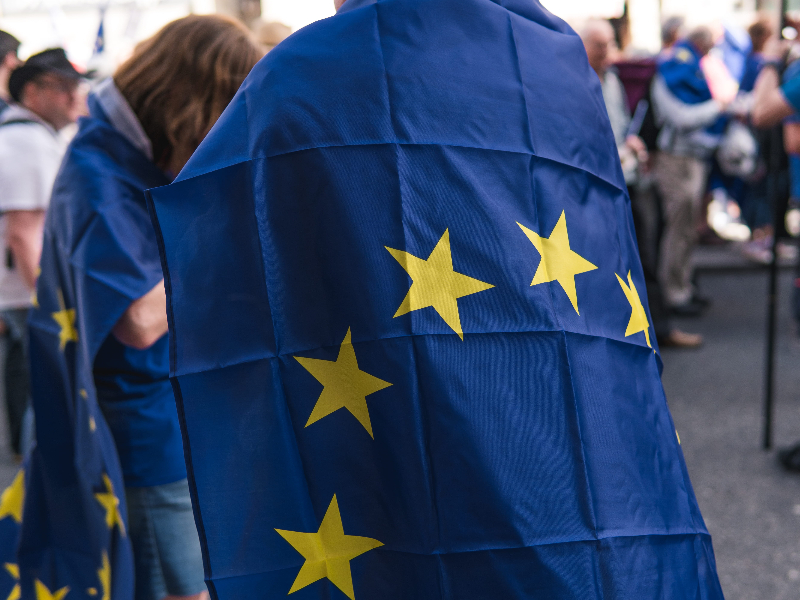An imbalance is emerging in the EU’s response to the Covid-19 pandemic. It is deciding on far-reaching economic measures without also providing the associated channels of democratic accountability. Neglecting this problem could result in profound harm to the union’s future.
As they try to manage the financial fallout of the coronavirus, EU governments are replaying the shortcomings of their response to the eurozone crisis a decade ago. Then, too, they failed to flank new instruments of economic cooperation with democratic reform. Through many bruising summits, leaders agreed to innovations such as the fiscal stability pact and the European Stability Mechanism and other forms of deeper economic cooperation. However necessary such crisis management was to contain the eurozone crisis, the new measures diluted citizens’ say over crucial decisions and aggravated a democratic disconnect at the EU’s core.
One result was that economic integration gradually pulled ahead of any effective democratic oversight of EU policies. This prevalence of technocratic decision-making gave oxygen to Europe’s surge of illiberal populism.
Economic solidarity
The COVID-19 pandemic has made most governments more open to much-needed forms of economic solidarity and stimulus than they were in the eurozone crisis – even if differences remain over exactly what form these should take. But there is less evidence that governments have learnt the more political, democracy-related lessons of the eurozone crisis. This political dimension has been strikingly absent from the EU’s agreement on short-term emergency and long-term recovery funding.
Governments insist they are committed to deepening democratic control. But in practice they have regularly baulked at ceding more influence and input to European citizens. Governments’ ritual commitments to making the EU more democratic and responsive to citizens have never been followed through.
The pandemic is pushing governments and EU institutions towards even more top-down modes of governance. Democracy issues risk falling further down the union’s agenda. Just as the virus struck, most member states were already trying to curtail citizens’ influence over the Conference on the Future of Europe – a major two-year exercise designed to revamp the way the EU works.
Getting the economics of interventionist packages right is the most urgent priority. But the political processes that undergird the much-heralded “return of big government” will also shape the EU’s post-pandemic fortunes. Big government can easily become opaque and technocratic with limited democratic participation and oversight. The recurring tendency to separate economics from politics has become a structural distortion that severely hampers EU integration.
Meeting the democratic challenge
If the EU is heading into an era of big government, large stimulus packages and more sizeable cross-border spending, its current democratic shortcomings will become more destabilising. Introducing EU-level economic measures without revamping processes of democratic control will unleash another cycle of the same legitimacy problems the EU suffered during the 2010s.
Tensions and divisions will deepen – between and within different nations – unless there is fully inclusive democratic input into decisions about where and how huge sums of money are spent across Europe. Popular disaffection with EU and national governance will also grow. That is another clear lesson from the eurozone crisis.
The most direct post-pandemic democracy challenge will clearly be to ensure that European governments fully relinquish the emergency powers they have assumed to manage the health emergency. Beyond this defensive agenda, however, the EU also needs a more positive and ambitious upgrade to its channels of democratic participation and accountability.
If it fails to move forward with such political reform, popular frustration pent up during the COVID-19 emergency period may eventually erupt. The crisis has given rise to a wave of community mobilisation across Europe. If they were to learn the right lesson from the eurozone crisis, governments would seek to harness and encourage this emergent civic spirit. They would see stronger democratic participation as a positive and helpful part of the post-virus rebuilding phase, rather than a minor sideshow or distraction from their high-level EU trade-offs.
EU leaders should commit to complementing their new economic rescue package with a democracy package. This must go well beyond the standard step of offering consultations in the European Parliament. It needs to pull together the plethora of emerging civic initiatives around Europe into a participatory process that has tangible and formal influence over EU crisis-related decisions.



 U.S. Announces Additional $6 Million in Humanitarian Aid to Cuba Amid Oil Sanctions and Fuel Shortages
U.S. Announces Additional $6 Million in Humanitarian Aid to Cuba Amid Oil Sanctions and Fuel Shortages  US Pushes Ukraine-Russia Peace Talks Before Summer Amid Escalating Attacks
US Pushes Ukraine-Russia Peace Talks Before Summer Amid Escalating Attacks  Iran–U.S. Nuclear Talks in Oman Face Major Hurdles Amid Rising Regional Tensions
Iran–U.S. Nuclear Talks in Oman Face Major Hurdles Amid Rising Regional Tensions  New York Legalizes Medical Aid in Dying for Terminally Ill Patients
New York Legalizes Medical Aid in Dying for Terminally Ill Patients  Trump Allegedly Sought Airport, Penn Station Renaming in Exchange for Hudson River Tunnel Funding
Trump Allegedly Sought Airport, Penn Station Renaming in Exchange for Hudson River Tunnel Funding  Missouri Judge Dismisses Lawsuit Challenging Starbucks’ Diversity and Inclusion Policies
Missouri Judge Dismisses Lawsuit Challenging Starbucks’ Diversity and Inclusion Policies  U.S.-India Trade Framework Signals Major Shift in Tariffs, Energy, and Supply Chains
U.S.-India Trade Framework Signals Major Shift in Tariffs, Energy, and Supply Chains  Trump Endorses Japan’s Sanae Takaichi Ahead of Crucial Election Amid Market and China Tensions
Trump Endorses Japan’s Sanae Takaichi Ahead of Crucial Election Amid Market and China Tensions  U.S. to Begin Paying UN Dues as Financial Crisis Spurs Push for Reforms
U.S. to Begin Paying UN Dues as Financial Crisis Spurs Push for Reforms  Pentagon Ends Military Education Programs With Harvard University
Pentagon Ends Military Education Programs With Harvard University  Trump Signs Executive Order Threatening 25% Tariffs on Countries Trading With Iran
Trump Signs Executive Order Threatening 25% Tariffs on Countries Trading With Iran  U.S. Lawmakers to Review Unredacted Jeffrey Epstein DOJ Files Starting Monday
U.S. Lawmakers to Review Unredacted Jeffrey Epstein DOJ Files Starting Monday  Norway Opens Corruption Probe Into Former PM and Nobel Committee Chair Thorbjoern Jagland Over Epstein Links
Norway Opens Corruption Probe Into Former PM and Nobel Committee Chair Thorbjoern Jagland Over Epstein Links  Trump Signs “America First Arms Transfer Strategy” to Prioritize U.S. Weapons Sales
Trump Signs “America First Arms Transfer Strategy” to Prioritize U.S. Weapons Sales  Ohio Man Indicted for Alleged Threat Against Vice President JD Vance, Faces Additional Federal Charges
Ohio Man Indicted for Alleged Threat Against Vice President JD Vance, Faces Additional Federal Charges  Trump Allows Commercial Fishing in Protected New England Waters
Trump Allows Commercial Fishing in Protected New England Waters  TrumpRx Website Launches to Offer Discounted Prescription Drugs for Cash-Paying Americans
TrumpRx Website Launches to Offer Discounted Prescription Drugs for Cash-Paying Americans 
































